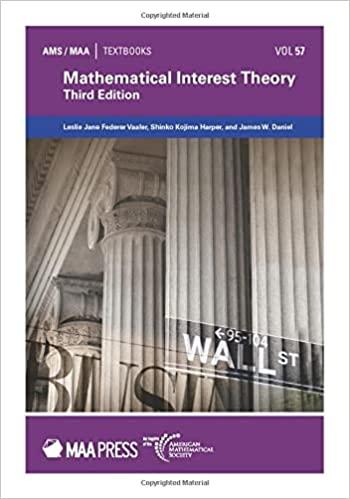Question
Q #1: Statistics and Parameters After randomly selecting 1,009 adults and surveying each of them, 545 of them indicated that they were not comfortable with
Q #1: Statistics and Parameters
After randomly selecting 1,009 adults and surveying each of them, 545 of them indicated that they were not comfortable with a drone delivering packages to them. The pollster concluded from the data that precisely 54 percent of all American adults are therefore not comfortable having drones make deliveries to them.
Determine whether the pollster's conclusion makes sense. Address whether the pollster is correct in drawing this conclusion based upon the given information. In preparing your answer, include the following terms:
- statistics and parameters,
- estimation,
- margin of error,
- and any other concepts from the assigned readings and/or class sessions you deem helpful and appropriate.
Q #2: Sampling and Sampling Methods
RoboCall Study: The research goal is to determine the average number of robocalls received each day by adults in Pennsylvania. Presented below are four potential options for collecting a sample for the RoboCall study. Determine which one of the four potential options shown below is most likely to result in a representative sample and explain why. Then explain why each of the other three choices are not likely to result in a representative sample for the RoboCall study. Insert your answers immediately below each of the four Sampling Methods presented below. In preparing your answer, include the following terms:
- representative sample,
- sampling bias,
- sampling approach (e.g., simple random sample, stratified random sample, convenience sample, etc.),
- and any other concepts from the assigned readings and/or class sessions you deem helpful and appropriate.
Sampling Method 1:
The 537 adults in Pennsylvania who respond to a survey published in a newspaper.
Sampling Method 2:
The first 537 people to visit a particular Philadelphia grocery store on a Sunday.
Sampling Method 3:
A set of 537 Pennsylvanians with phone numbers randomly selected from a list of all phone numbers in Pennsylvania.
Sampling Method 4:
A set of 537 Pennsylvanians randomly selected from a list of all licensed car owners in Pennsylvania.
Q #3: Types of Statistical Research Studies
Magnet Therapy Study: In a study of the effects of magnets on back pain, some subjects were treated with magnetic devices while others were given non-magnetic devices that looked identical to the magnetic devices. The researcher concluded that the magnetic devices did not appear to be effective in treating severe back pain.
Determine whether the study is an observational study, an experiment, or a meta-analysis, and explain your choice. In preparing your answer, include the following terms:
- Observational, Experimental and Meta-analytic study,
- Explanatory and Response Variables,
- Confounding Variables,
- Treatment and Control Groups,
- and any other concepts from the assigned readings and/or class sessions you deem helpful and appropriate.
Q #4: Critically Evaluating News Headlines
Healthy Chocolate headline: The New York Times published an article stating that chocolate "moves toward its rightful place in the food pyramid, somewhere in the high-tone neighborhood of red wine, fruits and vegetables, and green tea." It was noted that eating chocolate was associated with increased levels of antioxidants in blood and that chocolate flavonoids have been associated with decreased risk of heart disease and stroke. The funding for the research was largely funded by Mars. Inc. (the candy company) and the Chocolate manufacturers Association of America. The U.S. chocolate industry created the Chocolate Manufacturers Association (CMA) to serve cocoa producers by funding research, promoting chocolate consumption, and lobbying U.S. government agencies.
Determine whether the reported study is an observational study, an experiment, or a meta-analysis, and explain your choice. Identify one or more sources of potential bias and how the potential bias might have been avoided.
In preparing your answer, include the following terms:
- Potential Source(s) of bias,
- Observational, Experimental and Meta-analytic study,
- Explanatory and Response Variables,
- and any other concepts from the assigned readings and/or class sessions you deem helpful and appropriate.
Step by Step Solution
There are 3 Steps involved in it
Step: 1

Get Instant Access to Expert-Tailored Solutions
See step-by-step solutions with expert insights and AI powered tools for academic success
Step: 2

Step: 3

Ace Your Homework with AI
Get the answers you need in no time with our AI-driven, step-by-step assistance
Get Started


